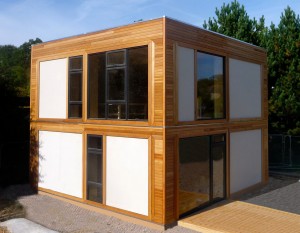 Avert the eyes. Yes, they are at it again. Brits hold no modicum of decency when it comes to their efforts at mating sustainable products with modern building methods. Hemp and straw are so pure and modest, while industry is so brutish and base. Will it ever work?
Avert the eyes. Yes, they are at it again. Brits hold no modicum of decency when it comes to their efforts at mating sustainable products with modern building methods. Hemp and straw are so pure and modest, while industry is so brutish and base. Will it ever work?
Modcell is attempting, in their Flying Factory, to create the illusive commercially viable, modular, super-insulated, high-performance, low energy ‘passive’ buildings built using renewable, locally sourced, carbon sequestering materials. I know, I know. Crazy. When will these money hungry, earth-lovers give up?
Seriously, will anyone ever figure out how to combine truly sustainable materials with commercially viable and modern construction techniques? Yes. Modcell has (and I am sure some others have too). But price is always the kicker. Earthen materials usually involve higher man hours and thus higher cost (as I have discussed in this blog before). Straw bale gets around this better than say, cob.
Prefab, modular walls cut down on construction time onsite, which is usually another drawback to earthen homes. But with Modcell, an average wall panel weighs well over a ton, requiring special equipment to assemble. (No problem for Modcell, because they make more money putting everything together with their Flying Factory equipment on site.) So how much does it all cost?
According to a Footprint blog, as quoted by Jetson Green’s write-up of Modcell’s BaleHaus at Bath, a 926 sq. ft. house would cost $214,000. Once you add the expense of the land this creates a price tag that hardly seems affordable. I can’t quite figure out why Modcell’s cost ends up this high, but apparently it does. Ultimately, I still have to ask, “Why would anyone pay to build a Modcell house when it costs more than conventional building?”
If I am a granola I can build my own house with straw and hemp and mud, and spend much less. If I am a yuppie I can hire a “green” contractor to get the job done for me without spending a whole lot more money, and the end product will be more personalized and unique. While I still hold out hope that the Granola Ethic can be commercialized for general consumption, we haven’t arrived yet. I commend Modcell for the grand experiment they are embracing. Maybe they will pave the path toward eventual success in creating a new species of home, one everybody on earth can embrace without dooming future generations.